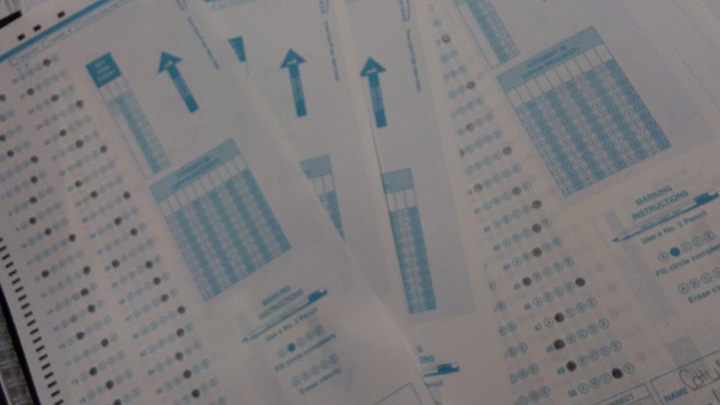Are we just a number
May 1, 2017
Standardized testing. A test “that requires all test takers to answer the same questions, or a selection of questions from common bank of questions, in the same way, and that is scored in a ‘standard’ or consistent manner, which makes it possible to compare the relative performance of individual students or groups of students” according to the Glossary of Education Reform. What are some examples of these standardized tests? The ACT, ISTEP, PSAT, and SAT.
“Standardized testing is stressful, and no one should ever have to take it,” said Braydon Titley, 11. “It is pointless.”
I find standardized testing ridiculous. They should not be used on the children of the future. They should not even be in existence on this planet. However, there are people who agree with me and others who disagree with me to some point.
“Personally, I believe the students after me should take standardized tests because everyone else has,” said Abragail Rigdon, 10. “Standardized tests just need to change before other students take it.”
The reasons why I am against standardized testing are many. There is stress that affects students and teachers as they struggle to cover all the subjects on whichever standardized test it may be. There is the corruption found in some schools that desire to be ranked higher than they are worth.
In April, ISTEP was back and, for me, it was the beginning of studying for the ACT and SAT, although my parents clearly wished that I began earlier. I found myself stressed out a week in advance for standardized testing.
However, I am not the only one. Because of No Child Left Behind, testing beings in third grade, but some schools begin testing students earlier. Their excuse is that students need to get used to taking tests by taking them, but all this does is destroy the childhoods of these children. Education researcher Gregory J. Cizek admits that testing “produces gripping anxiety in even the brightest students, and makes young children vomit or cry, or both.”
Not only are children the ones who are heavily affected by standardized testing but teachers also. The Annenberg Institute for School Reform reported in September 2010 that 17% of Houston teachers who were highly ranked on the Texas Essential Knowledge and Skills reading test were ranked terribly on the Stanford Achievement Test. These results used the same students, subject, and time of year but two different tests. Being rewarded or punished according these results encourages teachers to “cheat the system,” even if the school approves or disapproves behind doors.
Schools are lured to “teaching to the test,” which is education that only covers what is on the test and does not include good teaching techniques. Also, there have been cases of schools requesting students who were struggling in their studies to stay at home or drop the class and of erasing the wrong answers of students and correcting them.
I remember, from middle, a particular incident where a teacher prevented a fellow student from taking a particular standardized test and so that student did not take the test to maintain this specific teacher’s “squeaky-clean record.” Until April 2015, an Atlanta school had “weekend pizza parties” where the teachers were actually correcting students’ answers, when several of the district employees were convicted of racketeering.
There are plenty of other formats to put test questions in, other than true or false and multiple-choice. Having only one correct and right answer makes it appear that the adult world will be the same way, disillusioning the young in believing that there is always a clear division between black-and-white when it comes to what is right and what is wrong.
In addition, late education researcher Gerald W. Bracey, PhD, revealed that standardized testing cannot measure qualities like “creativity, critical thinking, resilience, motivation, persistence, curiosity, endurance, reliability, enthusiasm, empathy, self-awareness, self-discipline, leadership, civic-mindedness, courage, compassion, resourcefulness, sense of beauty, sense of wonder, honesty, integrity.”
Other advanced nations are doing better than the United States on recognized international exams. Finland, which was the nation ranked as having the highests international education by the Program for International Student Assessment (PISA) from 2001-2008, does not rank their students and schools using standardized tests. Instead, Finland has been using “assessments that encourage students to be active learners who can find, analyze, and use information to solve problems in novel situations.”
China, which was the nation ranked as having the highest international education by PISA during 2009, used the “drill and kill” test prep method that Chinese educators have admitted to not being the best method to prepare students for their adult lives. Other first world nations use performance-based assessments that base evaluations on real work, like essays, projects, and activities.
The children’s childhoods are being demolished, terrible teachers are being exalted, and excellent teachers are prevented from actually teaching students what is worth teaching. Schools are encouraged to maintain or better their rank by knowingly trying to affect their students’ performance, and there is no widespread recognition in the United States that there are better ways to evaluate the children of the world. Advanced nations around the world are using other types of assessments that do not include multiple-choice and short-answer formats.
